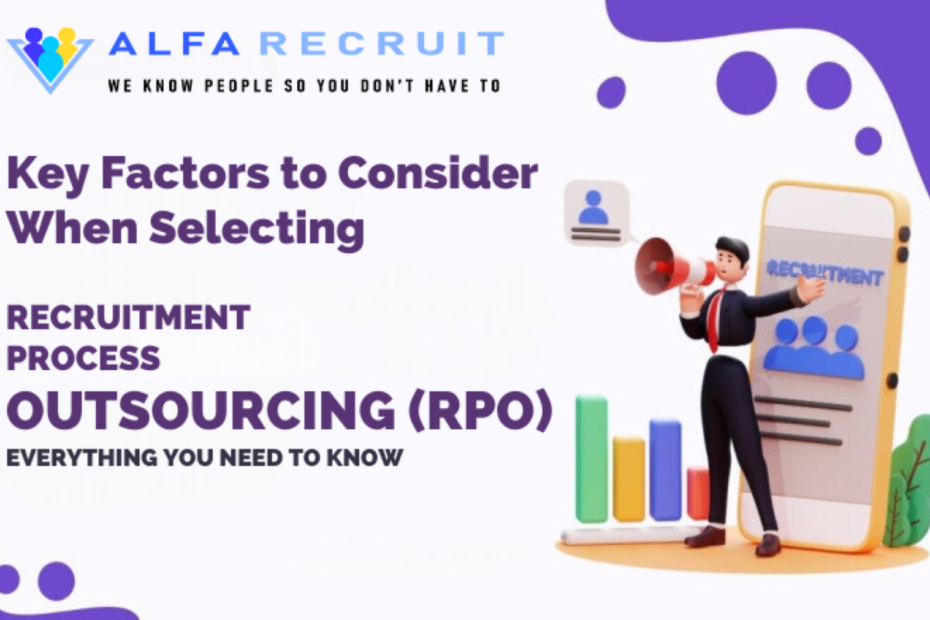Recruitment Process Outsourcing (RPO) is now seen as a strategic option for companies aiming to enhance their recruitment procedures, attract top talent, and boost business expansion. Collaborating with RPO providers enables organizations to utilize specific knowledge, adaptable solutions, and cutting-edge technologies to enhance their hiring strategies and attain successful hires. Nonetheless, choosing the appropriate RPO services entails thoughtful evaluation of various crucial aspects. Below, we will delve into these significant factors to assist organizations in making well-informed choices when selecting RPO services.
1. Industry Expertise and Specialization
When choosing RPO services, it is crucial to prioritize the provider’s industry knowledge and focus. Every industry presents distinct recruitment obstacles, talent dynamics, and regulatory demands that necessitate specialized expertise. Companies should opt for RPO providers with a strong history of achievements in their industry sector and a profound comprehension of sector-specific trends, top methods, and talent resources. By collaborating with an RPO provider proficient in their industry, organizations can access customized recruitment tactics and precise solutions tailored to their individual hiring requirements.
2. Scalability and Flexibility
Scalability and flexibility are key factors to consider when selecting RPO services, especially for businesses with varying hiring demands or seasonal peaks. It is vital for RPO providers to have the capability to adjust resources and services according to evolving business needs to sustain hiring progress and achieve recruitment targets. Businesses should assess RPO providers’ ability to increase or decrease recruitment activities, accommodate busy periods, and respond to unexpected fluctuations in hiring volume or priorities. Furthermore, adaptable contract terms, service levels, and pricing structures enable businesses to tailor RPO solutions to suit their budget and goals efficiently.
3. Technology and Innovation
In the current era of digital advancements, technology significantly impacts recruitment by enhancing efficiency, effectiveness, and innovation. When choosing RPO services, companies need to evaluate the provider’s technology setup, recruitment resources, and ability to utilize cutting-edge technologies like AI, machine learning, and data analytics. Sophisticated recruitment tools empower RPO providers to automate routine tasks, simplify processes, and obtain valuable insights on recruitment data and patterns. Through technology and innovation, RPO providers can achieve quicker time-to-hire, enhance candidate interactions, and deliver superior hiring results to their clients.
4. Candidate Experience and Employer Branding
The candidate experience and employer branding play crucial roles in shaping an organization’s capacity to draw in and keep top talent. While assessing RPO services, organizations ought to examine how the provider engages with candidates, communicates effectively, and offers support during the recruitment process. A favorable candidate experience, which includes prompt feedback, clear communication, and tailored interactions, boosts the organization’s employer brand and reputation within the talent market. Furthermore, RPO providers should showcase proficiency in employer branding tactics such as developing an employer value proposition (EVP), creating talent attraction campaigns, and promoting the employer brand. These efforts help organizations stand out as preferred employers.
5. Metrics and Performance Measurement
It’s important to measure the success and performance of recruitment to evaluate how well RPO services are working and to drive ongoing improvement. Companies need to set key performance indicators (KPIs) and metrics to keep track of recruitment results, like time-to-fill, cost-per-hire, quality-of-hire, and candidate satisfaction. When choosing RPO services, organizations should ask about how the provider measures performance, their reporting abilities, and accountability methods. Clear reporting and regular performance assessments help companies track progress, find areas to improve, and make sure everything aligns with strategic goals.
6. Cultural Fit and Alignment
Cultural compatibility and alignment between the organization and the RPO provider are essential for building a cooperative and efficient partnership. It is important for organizations to evaluate the provider’s values, work culture, and communication approach to confirm harmony with their own organizational culture and values. A solid cultural match encourages synergy, trust, and common objectives between the organization and the RPO provider, which helps in fostering effective collaboration and achieving mutual success in meeting hiring goals.

